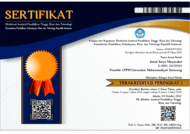Pembentukan Kelompok Peduli Penyakit Tidak Menular di Samigaluh, Kulon Progo
(1) Departemen Parasitologi, Fakultas Kedokteran dan Ilmu Kesehatan, Universitas Muhammadiyah Yogyakarta, Kabupaten Bantul, Indonesia
(2) Departemen Histologi, Fakultas Kedokteran dan Ilmu Kesehatan, Universitas Muhammadiyah Yogyakarta, Kabupaten Bantul, Indonesia
(3) Departemen Fisiologi, Fakultas Kedokteran dan Ilmu Kesehatan, Universitas Muhammadiyah Yogyakarta, Kabupaten Bantul, Indonesia
(4) Fakultas Kedokteran dan Ilmu Kesehatan, Universitas Muhammadiyah Yogyakarta, Kabupaten Bantul, Indonesia
(5) Fakultas Kedokteran dan Ilmu Kesehatan, Universitas Muhammadiyah Yogyakarta, Kabupaten Bantul, Indonesia
(6) Fakultas Kedokteran dan Ilmu Kesehatan, Universitas Muhammadiyah Yogyakarta, Kabupaten Bantul, Indonesia
(7) Fakultas Kedokteran dan Ilmu Kesehatan, Universitas Muhammadiyah Yogyakarta, Kabupaten Bantul, Indonesia
(8) Fakultas Kedokteran dan Ilmu Kesehatan, Universitas Muhammadiyah Yogyakarta, Kabupaten Bantul, Indonesia
(9) Fakultas Kedokteran dan Ilmu Kesehatan, Universitas Muhammadiyah Yogyakarta, Kabupaten Bantul, Indonesia
(10) Fakultas Kedokteran dan Ilmu Kesehatan, Universitas Muhammadiyah Yogyakarta, Kabupaten Bantul, Indonesia
(*) Corresponding Author
Abstract
Based on observations, information was obtained that the elderly hypertension rate was quite high (70%) in Ngaran II Hamlet. Some of the possible causes are the lack of knowledge and public awareness about non-communicable diseases (NCD), in addition to the lack of cadres and equipment. This causes the Posyandu not to run optimally. Integrated activities for field supervisors and students include forming a NCD care group. NCD prevention and screening training was given to members of the NCD Care group, with material on blood pressure checks, simple blood tests and determination of body mass index. At the beginning and end of the training, an evaluation was conducted to assess the level of knowledge of the participants. The NCD care group consists of 9 health cadres. The training methods include theory, discussion, and practice. Participants were aged between 36-54 years (43.6) with 55.56% high school education and 44.44% junior high school education. Of the 9 participants, only 7 completed the test. It can be seen that there is an increase in knowledge from the average pretest score of 45.54 to 68.75 post-test score. Statistical test using Paired T-test showed a significant increase (p 0.001). It was concluded that the training succeeded in significantly increasing knowledge about NCDs and their prevention
Keywords
Full Text:
PDFReferences
Ardi, Z. (2018). Hubungan Hipertensi dengan Hiperurisemia dan Hiperkolesterolimeia pada Jemaat GKSBS Purwodadi. Universitas Kristen Duta Wacana.
Gunawan, S. (2021). Skrining Faktor Komorbid Hipertensi pada Sasaran Lansia Vaksinasi Covid-19. Journal of Sustainable Community Development (JSCD), 3(3), 143–149. https://doi.org/10.32924/jscd.v3i3.55
Hariawan, H., Tidore, M., & Rahakbauw, G. Z. (2020). Perilaku Pencegahan Penyakit Tidak Menular Pada Remaja Ambon. Jurnal Keperawatan Terpadu (Integrated Nursing Journal), 2(1), 15. https://doi.org/10.32807/jkt.v2i1.46
Kementerian Kesehatan Repulik Indonesia. (2012). Buletin Jendela Data dan Informasi Kesehatan Penyakit Tidak Menular (pp. 1–28). Kementerian Kesehatan Republik Indonesia.
Kumala, M. (2021). Edukasi Pola Makan Sehat Dalam Upaya Pengendalian Hipertensi di Masa Pandemi Covid-19. Jurnal Bakti Masyarakat Indonesia, 4(1). https://doi.org/10.24912/jbmi.v4i1.10555
Newlove, A. A., Hannah, A. A., Felix, E. N., & Charles, A. (2012). The Impact of Lifestyle Variables and Dietary Patterns on Non-Communicable Diseases. J. Chem. Bio. Phy. Sci. Sec. B, 3(1), 264–275.
Wahyutomo, A. (2010). Hubungan Karakteristik dan Peran Kader Posyandu dengan Pemantauan Tumbuh Kembang Balita di Puskesmas Kalitidu-Bojonegoro. Universitas Sebelas Maret.
Warganegara, E., & Nur, N. N. (2016). Faktor Risiko Perilaku Penyakit Tidak Menular. Majority, 5(2), 88–94.
WHO. (2015). Global Health data Repository.
Wulandari, S. (2015). Hubungan Pengetahuan, Sikap Dan Perilaku Pencegahan Penyakit Menular Seksual (PMS) Dan HIV/AIDS Dengan Pemanfaatan Pusat Informasi Konseling Remaja (PIK-R) Pada Remaja SMKN Tandun Kabupaten Rokan Hulu. Maternity and Neonatal, 2(1), 10–22.
Yuningrum, H., Trisnowati, H., & Rosdewi, N. N. (n.d.). Faktor Risiko Penyakit Tidak Menular (PTM) pada Remaja: Studi Kasus pada SMA Negeri dan Swasta di Kota Yogyakarta. Jurnal Formil (Forum Ilmiah) KesMas Respati, 6(1), 41–50.
Article Metrics
Abstract view : 313 timesPDF - 62 times
DOI: https://doi.org/10.26714/jsm.6.1.2023.66-72
Refbacks
- There are currently no refbacks.
Copyright (c) 2023 Jurnal Surya Masyarakat

Jurnal Surya Masyarakat (JSM) is licensed under Creative Commons Attribution-NonCommercial-NoDerivatives 4.0
------------------------------------------------------------------------------------------------------------------------
Jurnal Surya Masyarakat (JSM)
p-ISSN: 2623-0364; e-ISSN: 2623-0569
Published by: Lembaga Penelitian dan Pengabdian Masyarakat (LPPM) Universitas Muhammadiyah Semarang



.jpg)







.jpg)